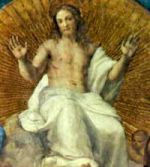Fathers of the Church
Letter LV. Festal
Description
Theodoret’s letters are a mine of information for the history of the fifth century, of the author’s life and of the history of dogma in general. This large correspondence is distinguished for its unpretentious learning, felicitous diction and perfect grace of style. It includes 14 specimens, including the present letter, of a new and interesting literary genre, the Festal Letters, as Theodoret himself calls them. They have nothing to do with the Festal Letters of the patriarchs at Alexandria (see the letters of St. Athanasius). Apparently, it was the etiquette at Antioch and Cyrus to exchange good wishes with friends, both clergy and lay, on the occasion of the great liturgical feasts. Most of Theodoret’s were sent out, not before, but after the holiday, which he speaks of as already passed. (Quasten)
Provenance
Theodoret of Cyrus (c. 393-466), the wise and zealous bishop of Cyrus, a small town near Antioch, was the last great theologian of the school of Antioch. Although he first considered Alexandrian Christology dangerous, and refused to condemn Nestorius until the Council of Chalcedon, his commitment to the correct doctrine of the Incarnation should not be questioned. As late as the 14th century more than 500 of his letters were extant, of which we still have 232.
by Theodoret in Unknown | translated by Blomfield Jackson
We are much distressed, for we are gifted with the nature not of rocks but of men, but the recollection of the Lord's Epiphany has been to me a very potent medicine; so at once I write, according to the custom of the feast, and salute your magnificence with a prayer that you may live in prosperity and repute.
Taken from "The Early Church Fathers and Other Works" originally published by Wm. B. Eerdmans Pub. Co. in English in Edinburgh, Scotland, beginning in 1867. (NPNF II/III, Schaff and Wace). The digital version is by The Electronic Bible Society, P.O. Box 701356, Dallas, TX 75370, 214-407-WORD.
To Fathers of the Church home page






